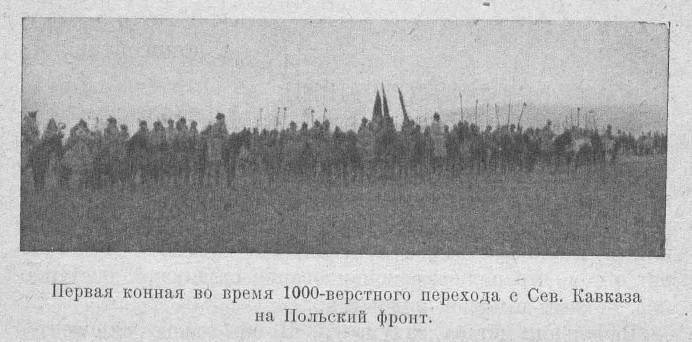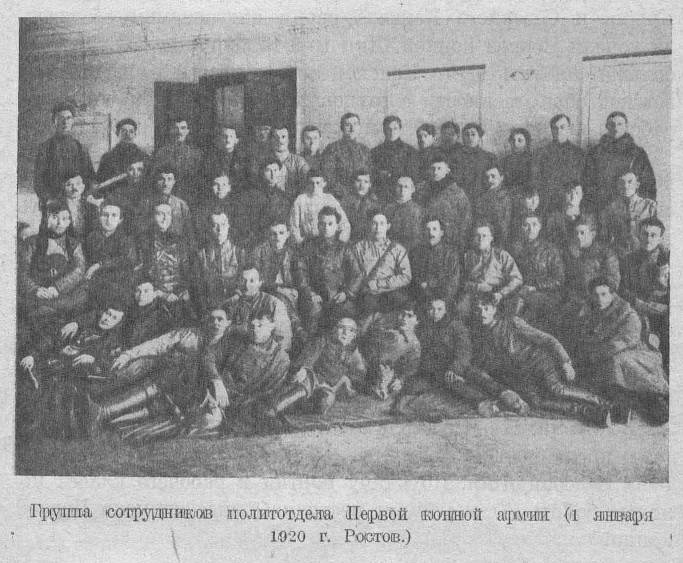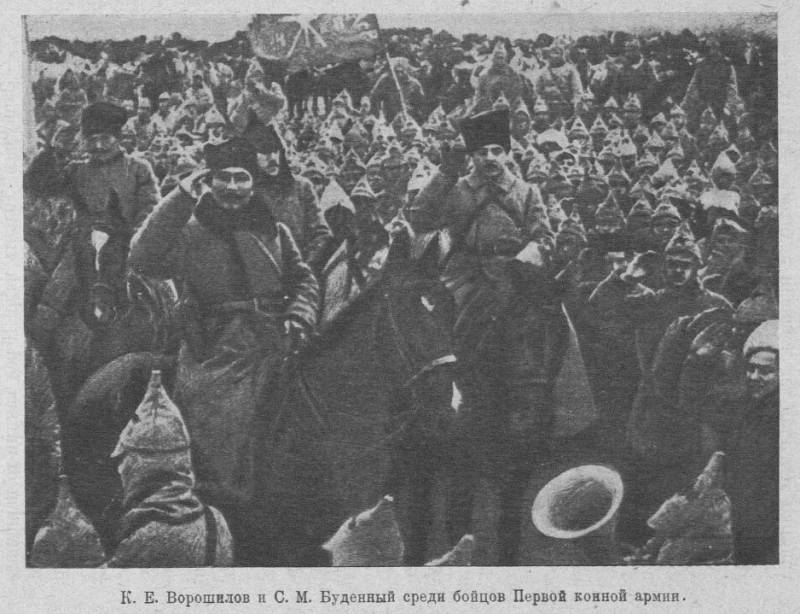Conarmia actions through the eyes of a Polish officer. July-August 1920 of the year
Of great interest in this regard is the enemy’s view of the actions of the Horse Army in 1920 on the Polish front of the Civil War. Historical The Bureau of the Polish General Staff issued the 2nd volume of Tactical Lessons from the History of the Polish Wars of 1918-1921. The book under consideration was written by Lieutenant Colonel of the General Staff F. A. Artishevsky and gives a description of the battles of the Polish 18th Infantry Division with Budenny's mounted army in the Ostrog - Dubno - Brody area from July 1 to August 6, 1920 - that is, in the most interesting author’s point of view, the period of hostilities that took place on the fields of Volhynia and Podolia from June to November 1920.
According to the testimony of a Polish expert, no one expected such major successes of the cavalry in the fight against infantry, which had modern weapons. At the same time, no one could understand why the Polish command, learning about the breakthrough of several Soviet cavalry divisions behind the rear of the infantry fighting position, ordered its troops to retreat on a wide front.
Zhytomyr breakthrough and measures of the Poles to counter it
As Artishevsky notes, breaking through the front at the junction of the 6 and 2 armies in the area of Squire - Samgorodok, Budenny threw the Polish 13 division into Kazatin and, with the whole mass of his cavalry, moved to Zhitomir and Berdichev. The units of the infantry divisions 1, 3, 6, and also the cavalry brigade of General Savitsky, hastily pulled up and thrown against Budyonny, could not do anything. Seeing the terrible situation created for the Ukrainian front of the Polish army, the commander of the 6 army, General Rommer decided to withdraw the 18 infantry division from his front, despite the fact that the red 14 army was pushing him and threw it through the Starokonstantinov in the direction on Exactly.
On the 2 of July, the vanguard units of the 18th Infantry Division, transferred by rail to Starokonstantinov, moved towards Zaslav.
From this day on, the combat service of this division, exceptional in its difficulty, begins.
The entire 5-week period of continuous battles was formed for the 18-th Infantry Division of three main stages: 1-th - movement for the Budenny Horse Army, which after 12-days of forced march and battles was finally overtaken. But, having entered into close contact with the enemy, the 18-I infantry division was too weak to give a decisive battle to the four horse and two infantry divisions of the enemy, which forced it to go to the 2-th stage - battles that only slowed down the movement of the Reds until fresh forces arrived in such numbers that would create conditions favorable enough for a decisive battle. This waiting period lasted 14 days - and during this time the Polish command pulled in the required number of troops.
A decisive battle near Brody began, lasting 7 days. This was the 3 stage.
The first period of battles from the 3 to the 12 of July, as mentioned above, was the movement of the 18 infantry division behind the Budenny Horse Army with the goal of giving it a decisive battle.
When General Rommer made the decision to remove the 18 infantry division from the Letichevsky division, i.e., on the 29 June, the main forces of the Cavalry Army were in the Kozhets area (Shepetovka - Kozhets - Sluch River). General Rommer believed that he would be able to regroup his army so quickly that already “over Gorynya, starting from Zaslavl”, the 18th Infantry Division would be able to take part “in the general battle against Budyonny”. But only on the 3 of July did General Craiovsky, the head of the 18 division, be replaced on his Letichevsky section with parts of the neighboring 12 division of the infantry.
This delay, in connection with other circumstances, resulted in the fact that "a general battle with the participation of the 18th Infantry Division could not be fought over Gorynya."
The Budennovites crossed the Goryn on the 3 of July near Gosha and Ostrog - and by the time the Polish 18 Division approached Zaslavl, the Reds were already in Rivne, pushing patrols towards Dubno and Klevani.
The decision of General Rommer to remove the 18 infantry division and send it to Goryn was very bold. The weakening of his army, on his own initiative, without an order from the high command, at a time when the enemy was pushing strongly at the army section near Kopai-city, Bar and Senyava, indicates a general understanding by General Rommer of the strategic situation prevailing for the Polish troops on the southern front.

The Polish 18 Infantry Division included the 4 Infantry Regiment of a three-battalion composition; each battalion - 3 rifle and 1 machine-gun companies (also in each regiment there was also a machine-gun company); in all four regiments there were 105 officers and 4 thousand soldiers. The regular 18 field artillery regiment consisted of 10 four-gun light batteries (75 mm French guns). Divisional cavalry - squadron of mounted shooters (70 saber). The divisions were assigned two battalions of the 44 regiment from the 13 infantry division, with 600 bayonets per battalion, one battalion of the Podholyansk infantry regiment from the 12 infantry division consisting of 300 people, the Ukrainian semi-battery at 2 The 6th Uhlan Regiment, consisting of 4's squadrons of 40 — 60 horses each and a machine-gun squadron with 4 heavy machine guns.
The cavalry army included 4 cavalry divisions with a total number of up to 20 thousand sabers and 2 infantry divisions (44 and 45 rifle).
The vigorous blow of the 18 Infantry Division against the enemy, which had grouped its forces to attack the left flank of the 6 Army in the area of Medvedovka, Sulzhin, Koskov, temporarily threw these forces northward. The 18-th Infantry Division, following its enemy, crossed Goryn, occupying the area of Belchin - Borisov - Pluzhnoye - Gnoynitsa (west of Zaslavl).
Such a deep separation from the left flank of the 13 infantry division, which occupied the previous positions at Starokonstantinov, and took advantage of the red 45 division - which struck the open flank of the 13 infantry division, and at a critical moment of withdrawal. Due to the fact that the 6 Army, weakened and extended in line, continued to remain in the positions occupied by the 18 Infantry Division during the successful offensive, the gap between the 2 Army and the 6 Army increased even more and the left flank of the 13 Army the division suffered even greater defeats on the 5-6 of July, and the rear was open to raids by the Soviet cavalry, which destroyed many valuable property in Black Island and Proskurov.
From the moment of the occupation of Zaslavl, when it was determined that the main forces of Budenny had already passed Exactly and were moving westward, General Craiowski immediately proceeded to search for these forces. He caught up with them in Ostrog, and attacked - in order to disturb Budyonny and threaten his rear. The movement of the division after the units of the Horse Army then continues in the direction of Dubno. Taking advantage of the fact that, under Rivne, a significant part of the Budyon army was associated with the battle of the 2 Army, which went on the offensive, the 18 Division hastens to occupy Dubno - to close the Dubna breakthrough, which allowed Budyonny to break away from the 2 Army and freely rush to Lviv.
12-th July 18-I division occupied the area of Willow. Being on the 1 of July, at a distance of 80 of kilometers behind the Horse Army, she already ahead of her on the 12 of July and, standing in front of her, got the opportunity to restrain her movement to Lviv until there comes a favorable moment for entering with Budyonny in decisive battle.
As a result of campaigns and battles, the 18 I Infantry Division during the period from 3 to 13 July overtook the Budyonny army and inflicted quite significant losses while the losses of the 18 Infantry Division were very small - but most importantly, that the Polish soldiers were personally convinced of the possibility of fighting the supposedly invincible parts of the Budyonny army and this greatly raised the spirit of the troops.
Lviv or Galicia?
The second period from the 12 to the 26 of July was called the period of inhibition of the actions of the Budyonny army. Although by this time the 2 Army had deployed troops towards Lutsk, nevertheless, there was still a gap of 6 kilometers between this operational association and the left flank of the 60 Army.
Budenny's desire to rush to Lviv was already clearly defined. The road to Lviv through Mlynov - Berestechko - Kamenka was completely open for him.

The reserves that could be opposed to the Cavalry Army were not only in the commands of the 2 and 6 armies and the Southern Front, but also in the High Command.
The first blow of the 18th Infantry Division occurred in the direction of Dubno on the 13 of July; as a result of this battle, one of the horse divisions was thrown back to the northern shore of Iqua, which undoubtedly affected the fulfillment of the movement plan outlined by Budyonny. Temporarily, the initiative of action passed into the hands of General Craiowski. In this battle a significant role was played located a little south of the mountains. Dubno Fort Zagorce, due to the resistance of which the advance of the Reds in the south direction was difficult. On the 14, 15 and 16 July, this stronghold again perfectly fulfilled its role.
Already on the 14 of July, the initiative for action passed again to Budyonny, which by the evening of that day had occupied Dubno and advanced its units in the direction of Brody.
The actions taken by him indicated that he continued to regard the breakthrough as wide as ever. His 4-I division crossed Ikva, east of Dubno, and already on the 14-th of July occupied Demidovka, taking the direction to Berestechko. Despite such an advantageous position, Budyonny did not use it. If he quickly concentrated his entire army in the area of Dubno and Mlynov, he could have overthrown the units of the 18 division and hit the 13 division located on the flank of the 6 army with an energetic blow. could successfully do what he did from the 26 of June to the 6 of July.
After the occupation of Rivne, on the 14 of July, Budyonny presented two possibilities:
1) “forgetting” about the Polish 2 and 6 armies, the main forces to move directly to Lviv - causing panic in the enemy rear lines;
2) strike with all forces together with the red 14 army on the flank of the 6 army of the Poles, smash it and open the road to Galicia.
Budyonny, however, did not choose for himself any of these possible solutions from the Polish point of view. In the period starting from the 10 of July, he scattered his forces from Rožić to Kremenets and Brod over a space of 100 kilometers, without taking anywhere to take decisive action.
During this period, Soviet infantry and equestrian divisions pursued either parts of the 18 division or the troops of the 2 army, however, always with relatively weak forces, which is why they did not achieve decisive success.
In the period from the 14 to the 26 of July, Budyonny did his best to advance towards Lviv. To this end, he alternately let his divisions pass through the gap between the 2 and 6 armies. At the same time, Budyonny is taking measures to prevent the flanks of the 2 and 6 armies from joining. On July 16, he attacks the 6 infantry division near Dorogostai, then on July 19 the attack 18 infantry division near Horupan, repels the advance of the 3 infantry division in the area of Torgovitsa-Perekale and goes over to the defense on this site; then attacks against the 18 division near Ivashchuki and Brody follow. But the success of all these attacks was expressed only in the capture of a certain space; they did not cause any significant damage to the enemy’s living force. The breakthrough is not closed. Budyonny is successful, moving forward, but the unbroken forces of the Polish 6 and 2 armies constantly delay his march, waiting for the moment to launch an offensive with the help of fresh forces.
The time lost then by Budyonny does not correspond to the results achieved by him.
The stubborn defense by a group of General Craiowski of their positions at Khorupani, despite the withdrawal of units of the Horse Army behind him, then a quick withdrawal from Khorupani, an unexpected transition to the offensive, the defense of Brod, and finally, the prevention of the Transition of the Horse Army through Styr (Lutsk-Berestechko section) the units of the 2 Army that went south along the Styr - this is the main success achieved by the Polish command.
The 18th Infantry Division at 24 on the 19 of July returned to Horzani in the Radziwills, and on the 22 of the day it went on the offensive against Kozin and Dobrovudka. This time the offensive was carried out already at the direction of the headquarters of the Southern Front, but the forces for this operation were still weak.
Budyonny settled down firmly in the Volkovysk-Khotin area and, like his actions near Mlynov, having successively defeated the 13 and 18-th Polish divisions, did not allow their unification for a joint attack.
Following the example of a retreat from Horupani, surrounded by the 18-I division, broke through on the night of the 23-th, leaving for Brody and then on Olesko - Podgorica. At this line, she carried out active defense and turned into counterattacks.
The ending should ...

Information